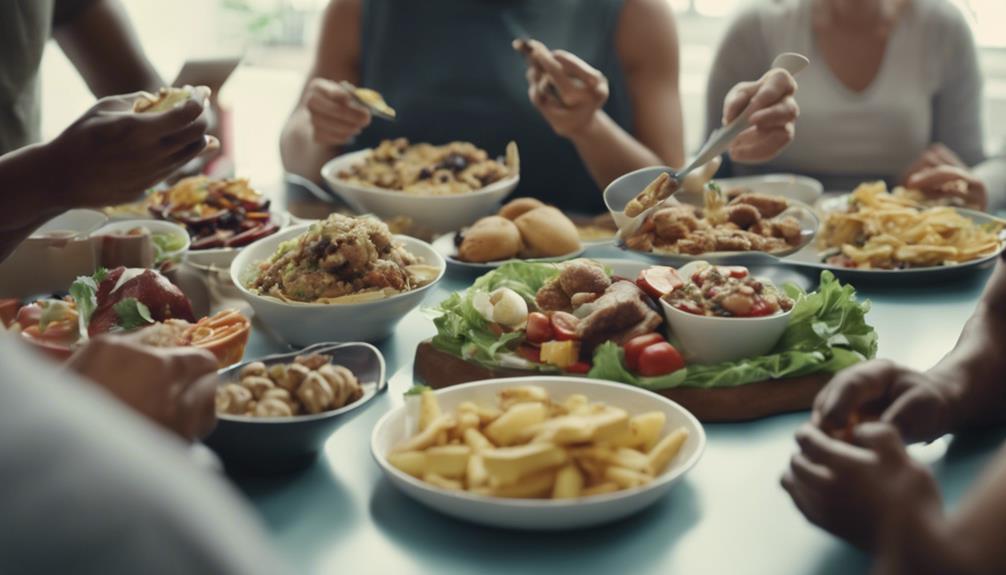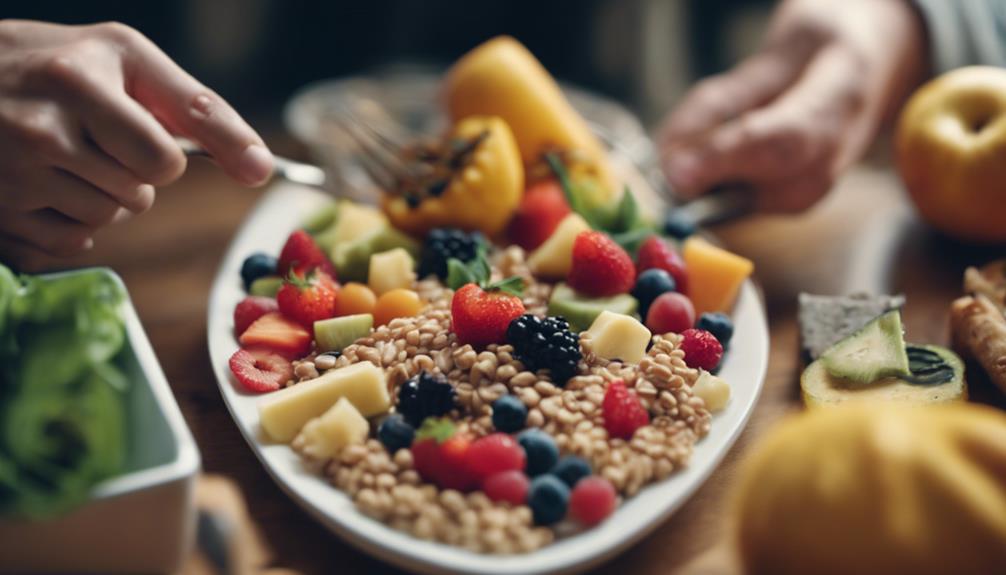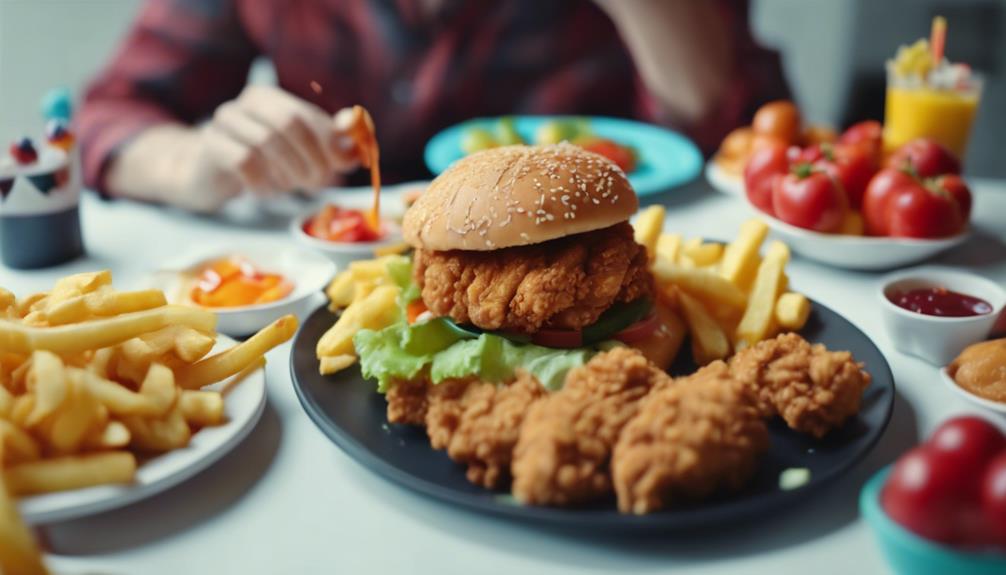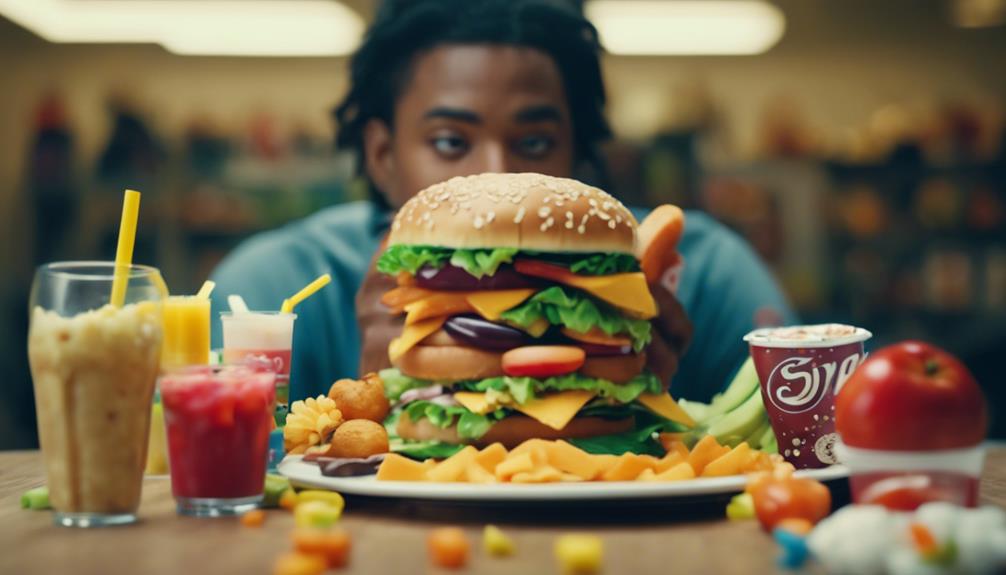So, you believe that you can eat anything and miraculously lose weight? Sorry to burst your bubble, but weight loss isn’t that easy! The truth is, losing weight requires a balance between what you consume and how much you exercise. Overeating won’t do the trick. You need to monitor your calorie intake, opt for nutrient-dense foods, and stay active! There’s a whole science behind it, trust me. However, if you’re interested in learning more about the secrets to successful weight loss, keep exploring. It’s not as straightforward as eating your way to a slimmer you!
Key Takeaways
- Weight loss reality: Eating anything without calorie control leads to weight gain.
- Balanced diet: Portion control and nutrient-dense foods are essential for sustainable weight loss.
- Caloric balance: Consistently consuming more calories than burned results in weight gain.
- Metabolism impact: Eating without moderation can hinder metabolic function and weight loss progress.
- Healthy choices: Opting for whole foods over high-calorie options supports weight management.
Eating Anything for Weight Loss
If you believe that eating whatever you want will lead to weight loss, you may be falling for a common misconception. Weight loss isn't a magical land where you can munch on endless cookies and still shrink your waistline. It's more like a numbers game – calories in versus calories out. So, what you eat and how much of it matters for effective weight loss.
When it comes to eating for weight loss, not all foods are created equal. Sure, you could technically lose weight by only eating donuts, but your body needs more than just sugar and fat to function properly. A healthy, balanced diet provides the energy and nutrients your body craves while supporting your weight loss goals.
Think of it as giving your body the VIP treatment it deserves!
Metabolism and Weight Loss

Let's chat about metabolism and weight loss – sounds like a wild ride, right?
Your body's metabolism is like a fancy engine that burns up calories from food and drink to keep you running smoothly. But hey, did you know that pumping iron and building those muscles can actually rev up your metabolism and help you torch those extra calories?
Metabolism and Calories
Understanding how metabolism and calories interact is essential for effective weight loss. Your metabolism dictates how many calories your body burns at rest, known as the basal metabolic rate. Factors like muscle mass, age, and genetics influence this rate.
Eating more calories than your body needs leads to weight gain because the excess gets stored as fat. On the flip side, if you consume fewer calories than you burn, weight loss occurs.
To shed those extra pounds, you need to strike a balance between your caloric intake and energy expenditure. Building muscle through exercise can help rev up your metabolism, causing you to burn more calories even when lounging on the couch.
Exercise and Fat Burning
Regular exercise plays an essential role in boosting metabolism and aiding in fat burning for effective weight loss. When you hit the gym or go for a run, your body kicks into high gear, burning calories even while you're chilling on the couch binge-watching your favorite show.
Aerobic exercises like running or cycling get your heart pumping, increasing fat burning both during and after your sweat session. But hey, let's not forget about strength training! Lifting those weights not only helps you build muscle but also revs up your metabolism, turning you into a calorie-burning machine.
And if you're feeling up for a challenge, high-intensity interval training (HIIT) is your jam. It boosts fat oxidation and ramps up your metabolic rate, leaving you feeling like a boss. So, whether you're hitting the pavement or lifting those dumbbells, staying active is key to torching those calories and keeping that metabolism fired up.
Keep moving, keep burning, and watch those pounds melt away!
Impact of High-Calorie Foods

Ever wondered why that extra-large soda or a jumbo burger mightn't be the best pals for your weight loss goals?
Well, buckle up because high-calorie foods can be sneaky little culprits, packing a calorie punch that can easily tip your balance.
High-Calorie Foods and Weight
Consuming high-calorie foods can greatly affect your weight and overall health. It's like having a love-hate relationship with your taste buds and your waistline.
Here are some key points to take into account:
- Weight Gain: Indulging in high-calorie foods beyond your body's needs leads to those extra calories being sneakily stored as fat, causing unwanted weight gain.
- Obesity Concerns: Regularly chowing down on high-calorie treats can be a one-way ticket to the land of obesity and its not-so-fun health companions.
- Caloric Intake: Balancing the number of calories you consume with the ones you burn is vital. It's like managing a budget where you can't overspend without consequences.
- Processed Snacks: Those oh-so-delicious processed snacks may taste heavenly, but they're often packed with more calories than you'd like, playing tricks on your weight loss goals.
- Portion Control: Watching portion sizes and opting for lower-calorie alternatives can be your secret weapons in handling the high-calorie food jungle while keeping your weight in check.
Nutrient Density Matters
Indulging in high-calorie foods can lead to weight gain if not balanced with nutrient-dense options that promote satiety and overall health. Sure, that slice of pizza or that tempting ice cream might make your taste buds do a happy dance, but if you're constantly chowing down on these high-calorie bombs without considering the nutrient density, your waistline might start to protest.
Nutrient-dense foods are like the superheroes of the food world. They pack a punch with essential nutrients like vitamins, minerals, and fiber, keeping you full and satisfied without stacking up a gazillion calories.
On the other hand, those sneaky high-calorie foods that lack these superpowers can trick you into overeating because they don't fill you up as much.
Mindful Eating Practices
When it comes to managing the impact of high-calorie foods, incorporating mindful eating practices can make a significant difference in your overall relationship with food and weight management.
Imagine this: you're faced with a decadent slice of chocolate cake. Instead of devouring it mindlessly, practice mindful eating. Here's how it can help you navigate those high-calorie temptations:
- Savor: By paying attention to each bite, you can truly appreciate the rich flavors and textures of high-calorie foods.
- Prevent Overeating: Mindful eating helps you tune in to your body's signals, preventing you from overindulging.
- Reduce Guilt: Enjoying a treat without guilt is possible when you savor it mindfully.
- Enhance Satisfaction: Being present while eating can enhance your satisfaction, making you less likely to reach for seconds.
- Build a Healthier Relationship: Developing mindful eating habits can lead to a healthier relationship with food, even the high-calorie kind.
Importance of Balanced Diet

Prioritizing a balanced diet is essential for supporting your overall health and weight management goals. When it comes to weight loss and well-being, what you put into your body matters more than you might think. A balanced diet not only provides your body with essential nutrients like carbs, proteins, fats, vitamins, and minerals but also helps regulate your metabolism, maintain energy levels, and keep your weight in check.
By incorporating a variety of whole foods such as fruits, veggies, lean proteins, whole grains, and healthy fats into your meals, you'll promote satiety, prevent nutrient deficiencies, and set yourself up for sustainable weight loss.
Forget about those 'magic' foods or trendy diets promising quick fixes. Focusing on a balanced diet is the real deal for long-term success and overall well-being. So, next time you're reaching for a snack or planning your meals, remember that balance is the key to a healthier, happier you!
Role of Exercise in Weight Loss

So, you wanna know about the role of exercise in weight loss? Well, let's get moving!
Exercise is like your secret weapon in the battle of the bulge – it helps you burn those pesky calories, build muscle, and rev up your metabolism for that extra oomph in shedding those pounds.
From running like the wind to pumping iron, there's a whole world of workouts waiting for you to explore and conquer.
Exercise for Weight Loss
Exercise is a key component in achieving weight loss goals as it boosts calorie expenditure and promotes fat loss effectively. So, if shedding those extra pounds is on your agenda, get ready to sweat it out and reap the benefits.
Here are some key points to keep in mind:
- Regular exercise is essential for weight loss as it helps burn calories and fat efficiently.
- Combining aerobic exercises such as running or cycling with strength training can help you build muscle and rev up your metabolism to aid in weight loss.
- Don't forget about high-intensity interval training (HIIT) – it's a quick and effective way to torch calories and promote weight loss.
- Exercise isn't just about weight loss; it also enhances overall health, reduces the risk of diseases, and boosts your mental well-being.
- For sustainable weight loss, consistency is key. Pair your workouts with a balanced diet for long-term weight management success.
Types of Workouts
To effectively achieve weight loss goals, it's important to understand the different types of workouts and their role in burning calories and promoting overall weight management.
Cardio exercises, like running, cycling, or swimming, are fantastic for getting that heart rate up and torching those pesky calories.
Strength training not only helps in sculpting those muscles but also boosts your metabolism for the long haul.
And let's not forget about the superhero of workouts – HIIT! High-Intensity Interval Training mixes intense bursts of activity with short rest periods, making sure those calories are history while improving your overall fitness level.
By incorporating a mix of cardio, strength training, and HIIT into your routine, you're not only shedding pounds but also building muscle mass and revving up your metabolism.
It's all about finding that sweet spot and creating a balanced exercise routine that keeps you motivated and on track to reach your weight loss goals.
Exercise Frequency Benefits
By increasing the frequency of your workouts, you can boost your metabolism and enhance your body's ability to burn calories efficiently throughout the day. So, lace up those sneakers and get ready to sweat it out for some fantastic benefits! Here are some cool perks waiting for you:
- Regular exercise helps maintain muscle mass, ensuring you look lean and toned even as you shed those extra pounds.
- Consistent workout routines are like superhero capes for your heart, improving cardiovascular health and boosting your endurance levels.
- Mixing up your exercises keeps things exciting and helps you avoid hitting a weight loss plateau, ensuring your progress keeps marching forward.
- Don't forget to throw in some strength training! It's like giving your muscles a secret handshake, supporting muscle tone and long-term weight management goals.
Genetic Factors in Weight Loss

Genetic factors play a significant role in determining how individuals respond to various weight loss strategies. Your DNA isn't just there to give you eye color or make you scream at jump scares in movies; it also influences how your body deals with food and exercise. Certain genetic variations can affect your metabolism, appetite, and how your body stores fat, all of which can impact your weight loss journey. Thanks to advancements in science, genetic testing can now provide insights into these factors, allowing for personalized weight loss plans tailored to your unique genetic makeup. Understanding your genetic predispositions can help you navigate through the myriad of weight loss strategies out there, guiding you towards approaches that are more likely to be effective for you. So, next time you're struggling to shed those extra pounds, remember, it might be in your genes, but that doesn't mean you can't outsmart them with personalized approaches.
| Genetic Factors | Impact on Weight Loss |
|---|---|
| Genetic Variations | Influence metabolism and fat storage |
| Appetite | Affects hunger levels and food cravings |
| Genetic Testing | Provides insights for personalized weight loss plans |
Fast Metabolism and Weight Loss

Improving your metabolism is a key factor in achieving successful weight loss. Your metabolism is like a little furnace inside you, burning up all those calories you consume.
Here are some tips to rev up that metabolic engine:
- Having a fast metabolism can help you in your weight loss journey, as it burns calories more efficiently.
- Factors like age, gender, body composition, and genetics play a role in determining your metabolic rate.
Want to give your metabolism a boost? Try incorporating regular exercise into your routine. It really gets things moving!
Don't forget to get enough sleep; a well-rested body tends to have a healthier metabolism.
When it comes to your diet, make sure to include plenty of protein and fiber. These nutrients help support a healthy metabolism and keep you feeling full longer.
Effects of High-Sugar Foods

So, let's talk sugar. Consuming high-sugar foods can have detrimental effects on your weight and overall health. When you indulge in those sugary treats, you're inviting weight gain to the party.
Why? Well, high-sugar foods are sneaky little things – they're often packed with calories but lack the nutrients your body craves. This excess sugar doesn't just disappear; it gets stored as fat, especially that stubborn visceral fat hanging around your organs.
Not only that, but sugar can play tricks on your blood sugar levels, causing rollercoaster rides of spikes and crashes. These blood sugar dips can leave you feeling like you need more of that sweet stuff, leading to cravings that just won't quit.
And let's not forget the long-term effects – high-sugar diets have been linked to obesity, insulin resistance, and an increased risk of metabolic disorders.
Effects of High-Fat Foods

High-fat foods can greatly impact your weight and health, much like high-sugar foods, by contributing to excess calories and potential weight gain. When you indulge in calorie-dense options like fried goodies or processed treats, you're inviting those extra pounds to sneak up on you faster than you can say 'cheeseburger.' These unhealthy fats not only love to stick around your waistline but can also pave the way for chronic health conditions to waltz right in.
To avoid this unwanted weight gain and health drama, consider balancing your plate with nutrient-dense alternatives. Think of swapping out that greasy bag of chips for some creamy avocado or crunchy nuts. These essential nutrients not only keep you feeling full and satisfied but also provide your body with the good stuff it needs to thrive.
Hindrances to Weight Loss

Various factors can hinder your weight loss progress, including overconsumption of calories, lack of physical activity, and hormonal imbalances.
Imagine chowing down on that extra-large pizza solo – delicious, right? But those sneaky calories add up faster than you can say 'extra cheese.' Pair that with binge-watching your favorite show instead of hitting the gym, and boom – weight loss becomes a distant dream.
Hormonal imbalances, like your body playing a prank on you, can also make shedding those pounds a tough battle.
Medical conditions like hypothyroidism or PCOS might join the party, making weight loss feel like a stubborn puzzle. Stress from work, poor sleep quality from late-night scrolling, or medication side effects turning you into a couch potato can further stall your progress.
Be wary of unsustainable dieting practices – say no to those crash diets promising instant results! Remember, Rome wasn't built in a day, and neither will be your dream body. So, watch those calories, get moving, and tackle those hurdles with a smile!
Conclusion
So, wrapping up, can you really eat anything and still lose weight?
Well, it's like hoping to win the lottery without buying a ticket – a nice thought, but not very likely.
While metabolism plays a role in weight loss, it's important to focus on a balanced diet and regular exercise to see real results.
So go ahead, enjoy your favorite foods in moderation, but remember, there's no magic pill for weight loss – just a little bit of hard work and dedication.









